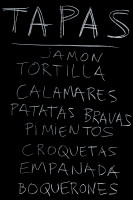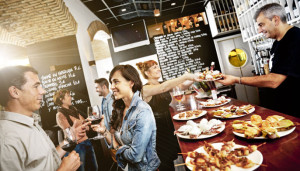 Tapas originated in Spain, where according to legend, King Alfonso X had been stricken with a serious illness which only allowed him to take in small portions of food with small amounts of wine. After recovering from his illness, the good king issued a decree that no wine should be served at inns unless it was served with food. Whatever the reason, today, tapas are the perfect way to experience the flavors and rich culture of Spain.
Tapas originated in Spain, where according to legend, King Alfonso X had been stricken with a serious illness which only allowed him to take in small portions of food with small amounts of wine. After recovering from his illness, the good king issued a decree that no wine should be served at inns unless it was served with food. Whatever the reason, today, tapas are the perfect way to experience the flavors and rich culture of Spain.
Tapas are not so much a kind of food as a Spanish way of eating. They are small plates of food accompanied by alcohol – usually wine, beer or sherry. Tapas are not to be confused with appetizers before a meal. Tapas can be any type of food – from nuts, olives, assorted cheeses to roasted meats and stews – so long as the dish is served on a small plate accompanied by alcohol. The most important thing about tapeo, or the art of eating tapas, is the socializing of the people around them. In Spain, small groups of people wander or ‘tapa crawl’ from bar to bar searching out the best locations which are lively, filled with animated conversation and laughter. Spainards go to tapa bars before lunch and supper to meet friends, to converse and to observe. Conversation can be animated and ranges from the mundane to the political to the philosophical – and anything in between.
 On our ‘tapas crawl’ we will search out the best tapas bars in Barcelona. You will be able to hear snippets of conversations by the locals. Don’t be surprised if you are approached by patrons wanting to practice their English. Be assured, you will taste the best tapas and experience this traditional Spanish custom. Close your eyes and pretend you are a local for a night!
On our ‘tapas crawl’ we will search out the best tapas bars in Barcelona. You will be able to hear snippets of conversations by the locals. Don’t be surprised if you are approached by patrons wanting to practice their English. Be assured, you will taste the best tapas and experience this traditional Spanish custom. Close your eyes and pretend you are a local for a night!
 They say, “Pintxos = life at its finest”. Pintxos are tapas prepared the Basque way and are an expression of ‘miniature cuisine’. The Basques call their tapas pintxos, (pronounced peench-os) from the Spanish word pinchar, meaning ‘to prick’. In San Sebastian, the same cultural and culinary tradition is called a ‘pintxos hunt’. On our pintxo hunt, we will see pintxos with banderillas, or long toothpicks, which get their name from the darts in a bullfight. Banderillas are helpful in holding together and picking up pintxos. Pintxos are small portions of food, generally taken from a bigger part or bread topped with an array of ingredients. A ‘pintxos hunt’ is an exciting culinary experience for foodies.
They say, “Pintxos = life at its finest”. Pintxos are tapas prepared the Basque way and are an expression of ‘miniature cuisine’. The Basques call their tapas pintxos, (pronounced peench-os) from the Spanish word pinchar, meaning ‘to prick’. In San Sebastian, the same cultural and culinary tradition is called a ‘pintxos hunt’. On our pintxo hunt, we will see pintxos with banderillas, or long toothpicks, which get their name from the darts in a bullfight. Banderillas are helpful in holding together and picking up pintxos. Pintxos are small portions of food, generally taken from a bigger part or bread topped with an array of ingredients. A ‘pintxos hunt’ is an exciting culinary experience for foodies.
In San Sebastian, the pintxos often reflect the gastronomy of this area. We will likely see more seafood pintxos due to the location of San Sebastian on the ocean. That’s not to say there will not be other kinds of pintxos make from meats, vegetables and fruits as well as dessert pintxos.

Taken from a local source, here are some basic guidelines on how to ‘behave’ in a pintxos bar:
- The best way to discover the real ambiance of San Sebastian is to ‘pintxos crawl’ and get in to the spirit of discovery, camaradie and fun!
- Find some room in a crowded bar so you can stand with your friends. Try to locate a place where you can leave your drink just in case you need both hands. Take a look at the pintxos in the menu (usually served hot) and the cold pintxos displayed on the bar counter to make your best choices.
- If you order hot pintxos, you can take the cold ones from the bar with your hands. If you feel more comfortable, ask for a small dish. If you want the bar pintxos to be heated, you can ask the barman to do so.
 Eat, drink, observe, listen and learn!
Eat, drink, observe, listen and learn!- After eating one or two pintxos and having a drink, most locals change to a different bar. If we decide to do that, we will ask for the bill, tell the barman how many we’ve eaten and what we’ve drunk (this process is a bit more complicated with a group, but we’ll make it happen). The system is based on honesty. We need to make those numbers accurate because the barman is usually memorizing what customers are taking, all the while!
- You can say, ‘Eskerrik asko, “Mila esker” or ‘Gracias” to thank them. “Agur” or “Adios” are the Basque and Spanish words to say good-bye.
- Next pintxos bar… repeat previous steps.
Something you shouldn’t do in a pintxos bar…or risk looking like a tourist:
- Some bars might offer you a big dish so you can fill it with a dozen pintxos from the bar counter (that’s for unwary tourists). Ask for pintxos one by one.. repeat previous steps.
 Basque pintxos are usually:
Basque pintxos are usually:
- An original slice of bread piled with food of any kind – speared with a banderilla
- Tiny miniature haute cuisine creations
- Flavored, elaborated bites of ‘heaven’
Are you ready to tapa crawl and pintxo hunt? Join us on this culinary adventure to Spain~ !
